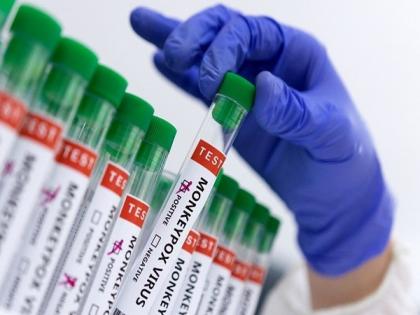Monkeypox cases in Europe tripled in last 2 weeks
By ANI | Published: July 1, 2022 08:53 PM2022-07-01T20:53:23+5:302022-07-01T21:00:08+5:30
Monkeypox cases in Europe have tripled in the last two weeks, the World Health Organization's (WHO) Europe chief warned as he urged countries to do more to ensure the rare disease does not become entrenched on the continent.

Monkeypox cases in Europe tripled in last 2 weeks
Monkeypox cases in Europe have tripled in the last two weeks, the World Health Organization's (WHO) Europe chief warned as he urged countries to do more to ensure the rare disease does not become entrenched on the continent.
"The WHO European Region represents almost 90 per cent of all laboratory-confirmed and globally reported cases since mid-May, and since my last statement on 15 June, six new countries and areas - taking the total to 31 - have reported monkeypox cases, with new cases tripling over the same period to over 4,500 laboratory-confirmed cases across the Region," WHO Europe chief Dr Hans Henri P. Kluge.
He said most cases reported so far have been among people between 21 and 40 years of age, and 99 per cent have been male, with the majority of those for whom we have information being men who have sex with men.
"However, small numbers of cases have also now been reported among household members, heterosexual contacts, and non-sexual contacts as well as among children," Kluge said.
The WHO official further stressed that there is simply no room for complacency -- especially right here in the European Region with its fast-moving outbreak that with every hour, day and week is extending its reach into previously unaffected areas.
"Compounding the challenge is the stigmatization of men who have sex with men in several countries. Many may simply choose not to present to health authorities, fearful of possible consequences. We know from our lessons in dealing with HIV how stigma further fuels outbreaks and epidemics, but allowing our fear of creating stigma to prevent us from acting may be just as damaging," he said.
Kluge also underscored that countries must quickly scale up surveillance for monkeypox, including sequencing, and obtain the capacity to diagnose and respond to the disease.
He said the right messages conveyed in the most understandable way must be disseminated to impacted communities and the wider public. Thirdly, he stated addressing monkeypox requires firm political commitment complemented by sound public health investments.
"As with any challenge, political leadership is required to support the public health response. Transparency goes hand in hand with public trust to ensure that gaps in responding to monkeypox can be swiftly addressed, and that countries partner with WHO and with each other for the collective good," he added.
( With inputs from ANI )
Disclaimer: This post has been auto-published from an agency feed without any modifications to the text and has not been reviewed by an editor
Open in app